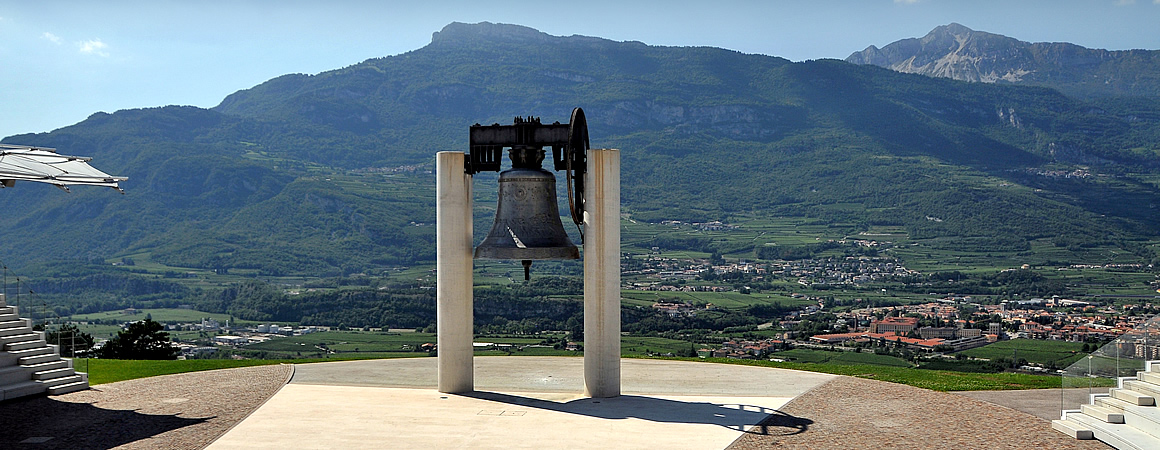As the reader can understand from these dramatic notes, in the space of a few hours Don Rossaro succeeded once more in extricating himself and refusing to attribute the ringing of the Bell to the German side first, and the American side second.. Just three weeks later, on the evening of 20 May 1945, in the presence of the Allied authorities as well as numerous combatants, the Bell of the Fallen tolled its one hundred strokes for the first time after eight long years of silence. As Don Rossaro had always predicted, the Bell would never sound its ritual 100 strokes until the "useless slaughter" had finally come to an end. But the start of its new life was not easy either. Since the electric-powered motor mechanism could not yet be used (it had not yet been fitted, as the engineers from Milan, for obvious reasons, had been unable to reach Rovereto), the clapper was moved manually by means of a rope, and the Bell was rung by brute force by the men of the UNPA (National Union of Anti-aircraft Protection). At last, Maria Dolens had returned to life and could sound its ringing for peace.
20 May 1945. The Bell rings at last!
20 May 1945. The Bell rings at last! It rings one hundred times: the first, isolated salute to the Fallen in war and the victims of the bombing.
20.30
20:30- A great crowd in the square: present on the balcony of the Town Hall is a British major, a representative of the Governor, the Podestà, the Archbishop etc. Relatives of the Fallen and the victims of the bombing have been invited. The Bell is rung manually by 15 strapping young men from the UNPA. In this gargantuan task, 3 out of 5 ropes broke!” 
HOMAGE BY DE GASPERI
On 19 April an unusual incident occurred during the evening ringing, which Don Rossaro noted in his diary: "At 9:30 this evening, while Rovereto - like the whole of Italy - was convulsively listening to the radio to hear the results of these historic elections, and a storm was whirling around the old bastion of the Castle, the monumental Bell was giving its solemn ringing to the world, when suddenly the sound was cut off, as if by the sword of a mysterious destiny!
“The clapper had broken! ...
and the great length fortuitously fell into the gun pit below, without causing damage! - Deo Gratias! The magnificent clapper, a gift from the Franchi Gregorini company in Brescia, is a beautiful work of art, and I have therefore decided that it should be carefully repaired and - once checked by experts - returned to its function. The event aroused great interest in the press and among the public..."
Following this incident the Bell remained silent for some days. The first illustrious visitor to the newly cast Maria Dolens was the Prime Minister, Trentino-born Alcide Degasperi, who paid tribute to the Bell on 20 August 1948. In his welcoming address on this occasion, Don Rossaro recalled how De Gasperi supported the idea of the Bell in 1923 from the columns of Il Nuovo Trentino, of which he was editor-in-chief; partly for this reason, at the conclusion of his visit the Bell rang “extra horam” in homage to the great statesman and one of its first supporters. On 2 November 1948, the radio broadcasts of the Bell's ringing were reinstated, and in 1949 the bell was automated with the fitting of an automatic clock donated by the Swiss watchmakers' society.
In these early postwar years - a time of great political and popular tension and of renewed ideological struggle between opposing groups, albeit in the context of greater democracy - Don Rossaro sought many times to "exploit" the huge charisma of Maria Dolens as a symbol of the city, seeking to "get round" statutory regulations. And so it was that very often events, both political and religious, were timed to coincide with the evening ringing of the Bell which, in spite of itself, became the accompaniment - and also a kind of ‘leveller’ to both the parades of red flags extolling the Republic and processions of the Madonna Pellegrina. Indeed, all these events, due to genuine “coincidence”, found themselves passing through Piazza del Podestà at the very moment of the evening ringing of Maria Dolens.
Political tricks and inexperience in the early postwar period.






